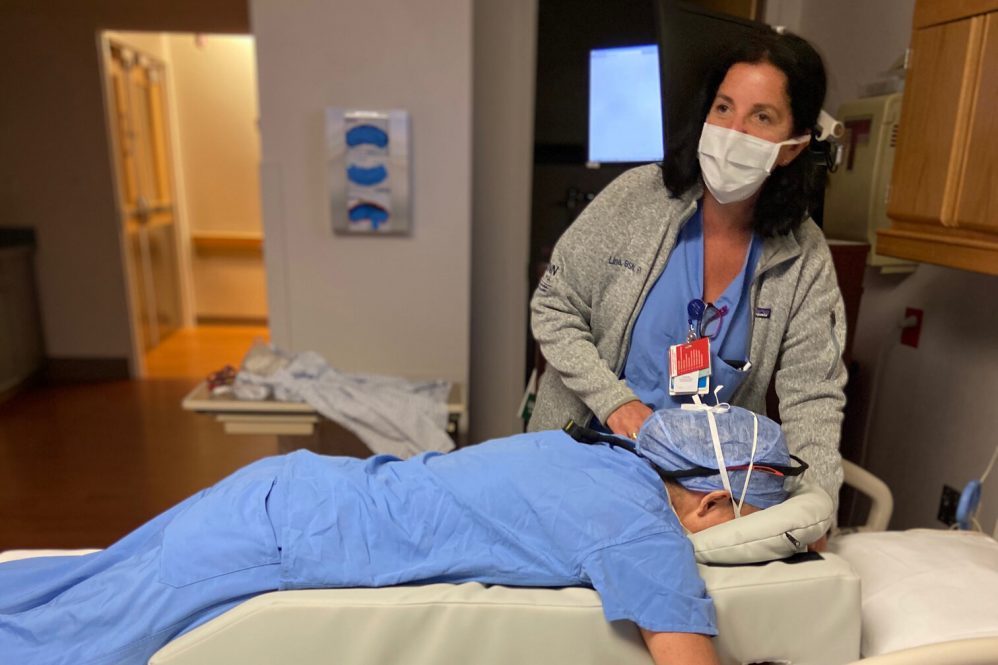Shortly after Christmas Melissa Vicchitto was not feeling well and attributed her lethargy and loss of appetite to her pregnancy. Her symptoms progressed over the next several days and she had a hard time going up the stairs and developed a fever of 105 degrees. Her husband called 911 and took her to the nearest hospital emergency room where she was given a rapid test for COVID-19 that came back negative.
Her oxygen needs were maxing out and a CT scan of her lungs looked as if they were that of a 30-year smoker. Due to concern about a serious lung condition and that she might need to be delivered prematurely she was transferred to UConn John Dempsey Hospital (JDH) for the benefit of its high-risk infant nursery.
“Even though her initial tests were negative on her admission to JDH, we managed Melissa based on the risk factor that she worked in a facility that had COVID positive patients and she had contact with the nurses and doctors at that facility,” says Dr. Winston Campbell, Professor and fellowship program director, Maternal-Fetal Medicine at UConn Health.
Melissa was subsequently PCR tested at UConn Health which came back positive for COVID-19.
When Melissa’s respiratory status became a concern, she was moved to the Intensive Care Unit (ICU) where she would be provided more intensive one-on-one care for her and the baby.
The concern was that there would be the potential that her illness may lead to the need for a cesarean section (C-Section).
“I was put on the maximum oxygen and as a precaution in the event, they needed to intubate me, I had to fill out and sign forms to give permission if they needed to do a blood transfusion or a C-section,” says Vecchitto.
At that time, her baby, a girl due in April, was only 26-weeks-old and her concern was for her pregnancy and she feared they would have to do a C- Section.
Doctors came a few times a day to check her and she had fetal monitoring every 8 hours.
“Everyone was so wonderful and caring, it wasn’t just about me, but also the baby,” says Vicchitto.
Vicchitto was given Dexamethasone, a steroid that accelerates the maturation of fetal lungs and has been successfully used to help those with COVID. She was also given an antiviral, Remdesivir, and other antibiotics.
While in the ICU, she used a special proning pillow to lay on her tummy for eight hours and her oxygen started getting better. Proning, or resting a patient on their stomach, opens up the lungs to facilitate breathing and increase oxygen levels. The proning pillow accommodates the changes that occur to the pregnant body and provides more comfort to the patient allowing them to stay in the prone position for many hours.
“The proning pillow was a lifesaver,” says Vicchitto.
The proning pillow was donated to JDH by Prone2help.org and has been lifesaving for some of our patients with their gravid belly,” says Carrie Ferrandino Nurse Manager, Maternal Child Health at UConn Health.
According to the Centers for Disease Control and Prevention, the overall risk of COVID-19 to pregnant women is low. However, pregnancy increases the risk for severe illness and death with COVID-19. Pregnant women who have COVID-19 appear more likely to develop respiratory complications requiring intensive care than women who aren’t pregnant.
“At JDH we have found the majority of patients coming in with COVID-19 are patients in labor and more than half of them have no symptoms at all,” says Campbell. “Patients who come into labor and delivery at JDH are either COVID tested before admission if delivery is scheduled or when they are admitted as part of the hospital’s COVID protocols.”
“Some patients who have no COVID symptoms may test positive on routine testing that is done before any scheduled delivery,” says Lina Godfrey, RN in the labor and delivery department at JDH. “This makes what should be a super exciting time for patients a stressful time.”
Pregnant patients can get very ill if they contract COVID and may end up in the ICU. However, according to Dr. Campbell, research has shown so far that the COVID virus does cross the placenta and the infants may have antibodies but the virus does not appear to affect the infant.
“I’ve never been this sick in my life and was so scared,” says Vicchitto.
Vicchitto acknowledges that the nurses were so great, knowing how lonely and isolating it was on top of her fear, they took the time to talk to her and even brought her Starbucks and spent extra time with her taking the time to get to know her and make her feel comfortable.
“Personally, Melissa taught me that inner strength, will, and trust can make all the difference,” says Godfrey.
While she was in the hospital, her husband, Eric, also tested positive for COVID but was fortunate to only have mild symptoms. Vicchitto was able to use an IPad and phone to keep connected to her husband and her 3-year-old daughter.
“The days that were hard for Melissa to breathe let alone talk were scary for many people especially her husband,” says Godfrey. “I remember speaking with Eric one day and he was expressed much gratitude for everything we were doing for his wife.”
“Even though I haven’t met anyone I feel so connected to everyone there,” says Eric Vicchitto, Melissa’s husband.
After a total of 22 days in the hospital with almost two weeks in the ICU, Melissa’s oxygen levels stayed at 95% and she was able to go home.
Vicchitto is currently home and feels better every day. She’s scheduled for a C-section in April and looks forward to welcoming her new daughter to their family.
“This experience changes everything and gives you a new perspective,” says Vicchitto.



